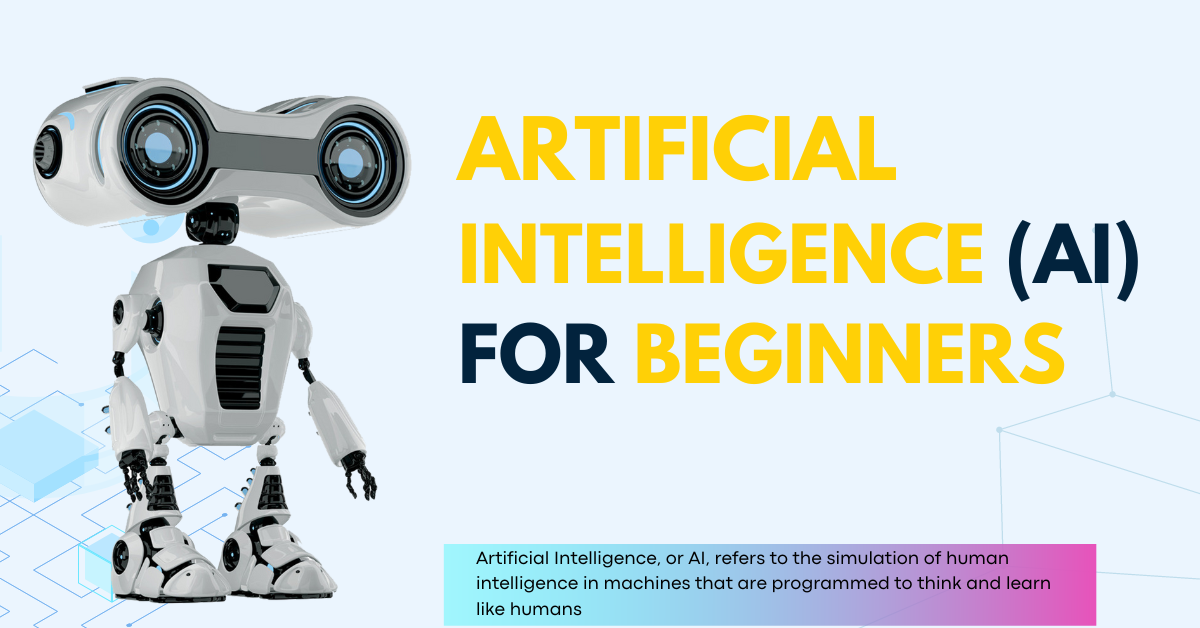AI for Beginners : The Ultimate 2024 Guide
Table of Contents

Artificial Intelligence (AI) is a fascinating and rapidly evolving field that has the potential to transform nearly every aspect of our lives. For beginners, AI can seem complex and intimidating, but it essentially involves creating machines that can perform tasks that typically require human intelligence. These tasks include learning from experience, understanding natural language, recognizing patterns, and making decisions. AI applications are already all around us, from voice assistants like Siri and Alexa to recommendation systems on Netflix and Amazon. Starting with the basics of machine learning, which is a subset of AI that focuses on teaching machines to learn from data.
AI for Beginners can gradually explore more advanced concepts such as neural networks and deep learning. By understanding the foundational principles and practical applications, anyone can begin their journey into the exciting world of AI.
What is Artificial Intelligence?
Artificial Intelligence, or AI, refers to the simulation of human intelligence in machines that are programmed to think and learn like humans. These machines can perform tasks that typically require human intelligence, such as recognizing speech, making decisions, solving problems, and translating languages.
Types of AI
AI can be broadly categorized into two types:
- Narrow AI: Also known as Weak AI, for AI for Beginners Narrow AI is designed to perform a specific task. Examples include voice assistants like Siri and Alexa, recommendation algorithms used by Netflix and Amazon, and autonomous vehicles. Narrow AI is very good at its designated task but doesn’t possess general intelligence or understanding beyond that.
- General AI: Also known as Strong AI or Artificial General Intelligence (AGI), this type of AI would have the ability to understand, learn, and apply knowledge across a wide range of tasks, much like a human being. As of now, General AI is theoretical and has not yet been realized.
Why AI Matters
AI for Beginners that AI is revolutionizing numerous industries by enhancing efficiency, improving decision-making, and creating new opportunities. Here are a few reasons why AI is so important:
- Automation: AI can automate repetitive and mundane tasks, freeing up human workers to focus on more complex and creative activities.
- Data Analysis: AI can process vast amounts of data quickly and accurately, uncovering patterns and insights that might be missed by human analysts.
- Personalization: AI algorithms can analyze user behavior and preferences to provide personalized recommendations and experiences.
- Innovation: AI is driving innovation in fields such as healthcare, finance, transportation, and entertainment, leading to breakthroughs that were previously unimaginable.

How AI Works
At its core, AI relies on data and algorithms. Here’s a simplified explanation of how AI systems work:
- Data Collection: AI systems need a large amount of data to learn from. This data can come from various sources, such as text, images, audio, and sensors.
- Data Processing: Once the data is collected, it’s processed and cleaned to ensure it’s suitable for analysis. This step often involves removing errors, filling in missing values, and standardizing formats.
- Model Training: The processed data is then used to train machine learning models. These models learn to recognize patterns and make predictions based on the data they are trained on.
- Inference: After the model is trained, it can make predictions or decisions based on new data it encounters. For example, a trained image recognition model can identify objects in a new photograph.
- Evaluation and Improvement: AI models are continuously evaluated and improved based on their performance. This involves testing the model with new data and fine-tuning it to enhance accuracy.
Getting Started with AI for Beginners
If you’re interested in diving into the world of AI, here are some steps to get you started:
Step 1: Learn the Basics
Understanding the fundamental concepts of AI is the first step. There are many free resources available online that can help you get started:
- Online Courses: Platforms like Coursera, edX, and Udacity offer beginner-friendly courses on AI and machine learning.
- YouTube Channels: Channels like “CrashCourse” and “3Blue1Brown” provide excellent video tutorials on AI and related topics.
- Books: There are numerous books that provide a solid introduction to AI, such as “Artificial Intelligence: A Guide for Thinking Humans” by Melanie Mitchell.
Step 2: Get Hands-On Experience
Once you have a basic understanding of AI concepts, it’s time to get some hands-on experience:
- Programming Languages: Learn programming languages commonly used in AI, such as Python and R. These languages have extensive libraries and frameworks for AI development for AI for Beginners.
- Projects: Start with small projects to apply what you’ve learned. For example, build a simple chatbot, create a recommendation system, or work on a computer vision project.
Here’s a simple Python code example for building a basic AI chatbot using the nltk library:
import nltk
from nltk.chat.util import Chat, reflections
# Sample conversation pairs
pairs = [
[
r"my name is (.*)",
["Hello %1, How are you today?",]
],
[
r"what is your name?",
["My name is Chatbot and I'm here to help you.",]
],
[
r"how are you?",
["I'm doing good. How about you?",]
],
[
r"sorry (.*)",
["It's alright.",]
],
[
r"i'm (.*) (good|well|okay|ok)",
["Nice to hear that.",]
],
[
r"quit",
["Bye! Take care.",]
],
]
# Creating a chatbot instance
chatbot = Chat(pairs, reflections)
# Starting the conversation
print("Hi, I'm your friendly AI chatbot. Type 'quit' to exit.")
chatbot.converse()
Step 3: Explore Advanced Topics for AI for Beginners
As you become more comfortable with AI, you can start exploring more advanced topics:
- Deep Learning: A subset of machine learning that focuses on neural networks with many layers. It’s particularly effective for tasks like image and speech recognition.
- Natural Language Processing (NLP): This field focuses on the interaction between computers and human language, enabling machines to understand and generate text.
- Reinforcement Learning: A type of machine learning where an agent learns to make decisions by interacting with an environment and receiving feedback.
Here’s an example of a simple neural network using the tensorflow library:
import tensorflow as tf
from tensorflow.keras.models import Sequential
from tensorflow.keras.layers import Dense
# Generate dummy data
import numpy as np
data = np.random.random((1000, 32))
labels = np.random.random((1000, 10))
# Create a simple neural network model
model = Sequential()
model.add(Dense(64, activation='relu', input_dim=32))
model.add(Dense(64, activation='relu'))
model.add(Dense(10, activation='softmax'))
# Compile the model
model.compile(optimizer='adam', loss='categorical_crossentropy', metrics=['accuracy'])
# Train the model
model.fit(data, labels, epochs=10, batch_size=32)
Step 4: Stay Updated
AI is a rapidly evolving field, so it’s important to stay updated with the latest developments:
- Follow AI Researchers: Many AI researchers share their latest work and insights for AI for Beginners on social media platforms like Twitter and LinkedIn.
- Read Research Papers: Websites like arXiv.org host research papers on AI and machine learning. Reading these papers can provide deep insights into cutting-edge technologies.
- Join AI Communities: Online communities like Reddit’s r/MachineLearning and AI-specific forums are great places to discuss ideas, ask questions, and learn from others.

Real-World Applications of AI
To understand the impact of AI, let’s look at some real-world applications:
- Healthcare: AI is being used to diagnose diseases, predict patient outcomes, and personalize treatment plans. For example, AI algorithms can analyze medical images to detect early signs of conditions like cancer.
- Finance: AI is transforming the finance industry by improving fraud detection, automating trading, and providing personalized financial advice. Robo-advisors use AI to manage investment portfolios.
- Retail: AI-powered recommendation systems help retailers suggest products to customers based on their preferences and past behavior. Chatbots enhance customer service by providing instant assistance.
- Transportation: Autonomous vehicles use AI to navigate and make driving decisions. AI is also used in traffic management systems to optimize traffic flow and reduce congestion.
- Entertainment: Streaming services like Netflix and Spotify use AI to recommend movies, shows, and music to users based on their tastes.
Ethical Considerations in AI
As AI becomes more prevalent, it’s crucial to consider the ethical implications:
- Bias: AI systems can inherit biases present in the data they are trained on. It’s essential to ensure that AI models are fair and unbiased.
- Privacy: AI systems often require large amounts of data, raising concerns about privacy and data security. It’s important to handle data responsibly and transparently.
- Job Displacement: Automation powered by AI can lead to job displacement in certain industries. It’s important to consider the social impact and provide support for affected workers.

Conclusion
Artificial Intelligence (AI for Beginners) is a fascinating and transformative field with the potential to revolutionize many aspects of our lives. By understanding the basics, getting hands-on experience, and staying updated with the latest developments, you can become proficient in AI and contribute to its exciting future.
NOTE: You can also read


3 thoughts on “AI for Beginners : The Ultimate 2024 Guide”